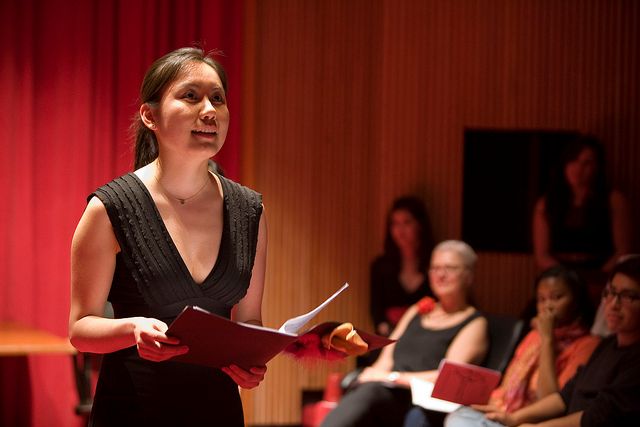If Only These Lips Could Speak of Respect

Let’s face it. Even without knowing anything about “The Vagina Monologues,” the fact that it is about vaginas is enough to know that we are dealing with some heavy topics here. It seems like the concept of femininity, of womanhood, is incomplete without a conversation about sex. And when we say sex, we mean sex as power, as rape and abuse, as tangible proof that women are still being treated unfairly.
Yet facing these truths is often too difficult, too depressing, and ultimately too awkward for us to talk about. It is within the more structured situations like the student performance “If These Lips Could Talk” that we find the courage to acknowledge that not only does rape happen, but it happens among us.
“If These Lips Could Talk” was a show inspired by previous performances of Eve Ensler’s “The Vagina Monologues.” Students wrote their own pieces based on those performances, the Women of Amherst compiled these experiences to create a uniquely Amherst script and voila! “If These Lips Could Talk” was born. Proceeds went to the New England Learning Center for Women in Transition (NELCWIT).
Deftly navigating the dark waters of injustice and helplessness, the show raised some questions and answered others. The questions that were answered — that people were raped, sexually disrespected, shamed and lonely and hurt — were sobering to admit. Even more sobering to realize is that as liberal, progressive and isolated as Amherst is thought to be, the College is not safe. The questions that were raised – of what we can do and why these things happen – were an invitation by the “If These Lips Could Talk” cast to start a meaningful and critical discussion to do something positive about it.
It would be incredibly easy to dismiss the show as feminist (and therefore angry and man-hating), but those negative connotations ignore the fact that these “bra-burning” feminists have a point. There is something very wrong in the way our society shames rape survivors and ignores sexual disrespect. Sexism is real and ugly and here. Everyone has seen it happen — and everyone has ignored it at least once.
And there we go — “If These Lips Could Talk” as a springboard for potential action, full of politically charged ideas. But even as the show traverses the boundaries of sexism, racism, socioeconomic classism and other “isms,” it brings to mind that diversity doesn’t apply just to labels. Amherst has a diversity of experience, some of trauma but also of strength.
But “If These Lips Could Talk” is not about rape or blame. And as the central theme of talking suggests, the show was not primarily about the questions. It was about women sharing their secrets and having others listen. About having other people care, about finding solidarity with those that share the same experiences. It was about building a community — a community that works to prevent future events of sexual disrespect but is in no way defined by it.
Yet, I’m quite aware of how difficult that is — even as easy and “kum-ba-ya” it sounds. In our academically competitive schedule and success-oriented lifestyle, it seems trivial to think critically about what it means to be a young woman at Amherst. Or, for the men, to think about what it means to live and interact with young women at Amherst. But it is a crucial part of our identity, especially in a patriarchal world (as much as we may pretend it isn’t). Patriarchy affects the way we think and the way we act, and when small acts of disrespect add up, they explode into unforgivable acts of abuse.
So let’s take it from the examples given to us by the “If These Lips Could Speak” writers. Let’s think critically about sex, gender and how those two are expressed. Let’s go beyond the theoretical and ideological and into the personal, subjective and meaningful. In the discussions we have, we might find support, a friend and maybe even a sister or brother. But we can only do this if we talk and act — and unfortunately, “If These Lips Could Speak” is the exception, not the rule. Pessimistically speaking, this kind of solidarity isn’t going to happen, not in our politically inactive, happy-go-lucky, awkward Amherst bubble. The only way it will is if we want to change that.
Do we? I’m not sure, but in the meantime, let me tell you about imagination. It is beautiful and full of potential. It is life-affirming and wonderful and the stuff that dreams are made of. It is pretty words and marvelous pictures and maybe even hippies. But all of that doesn’t matter if that’s all it is.





Comments ()